- Home
- Mary Hooper
Poppy in the Field Page 10
Poppy in the Field Read online
Page 10
That afternoon there were no jokes or high jinks from the boys in Ward 5.
Chapter Thirteen
Casino Hospital,
Nr Boulogne-sur-Mer,
France
18th May 1916
Dear Miss Luttrell,
How kind of you to send the bedsocks so promptly, and I must apologise for my slowness in writing to thank you. Please tell your comforts group that the socks were very well received by our boys – and the ward certainly looks a gayer place with a stripy bedsock on the end of each plastered leg.
We have been very busy here, with convoys arriving from all over the place, bringing in all nationalities. We had a German lad who sadly died, and the next ward to ours has some Indian fellows. There are Chinese, Russian and Congolese casualties as well – they’ve all been fighting or working alongside our own boys. The sister in the next ward tries to find each man’s national flag to pin on the wall and make them feel at home, but says it is becoming more and more difficult.
Today I am going out with friends and we are having a whole day out! These are two American girls, Dot and Tilly, trained nurses at a hospital just down the road, who are very conscientious about their work but also great fun.
What do you think about this? American nurses are allowed to wear a little make-up. Also, they can go out to music halls and other entertainments with officers and (most annoyingly of all) are allowed to go dancing! Does that seem fair? All the British nurses and VADs are very cross about it and I think most sisters would agree with them, but, of course, these are army regulations and the sisters would never go against them. Someone spoke to our matron about dancing a couple of days ago and she said that the ban is for our own good, to ensure that nurses are respected and kept in high regard by the people of whichever country they’re in. Really! It’s not as if we’re going to dance the cancan in the street.
My friends are waiting so I will close now, hoping this finds you as well as it leaves me.
With every good wish,
Poppy xxx
Poppy addressed the envelope. The only trouble with writing to Miss Luttrell, she’d found, was that she lived in Mayfield, where Poppy had worked for the de Vere family and fallen in love with Freddie. This meant that writing that one simple word on the envelope, Mayfield, brought everything back to her.
But she would not let these memories spoil the treat of a day’s outing with Dot and Tilly, she resolved, putting on her outdoor uniform and leaving the hospital.
She’d been told that her two friends would be outside and presumed they’d be waiting on the steps. When she came out, however, she couldn’t see them.
The area was bustling, as usual, with soldiers, nurses and all manner of vehicles. Some of these were motorised, some horse drawn, and there was also a handcart being pushed by a worried-looking man, with table, chairs, cushions, crates, bedsteads and mattresses – seemingly the entire contents of a small house – piled high upon it. Perched precariously on the very top were a dog in a basket and a child. Poppy, who’d seen such scenes in Boulogne before, knew it was either a refugee French or Belgian family who’d been moved on by the Germans. They’d be hoping to find a room in town perhaps, or – if they were lucky – obtain places on a boat bound for England.
Ten working horses went across the square, two by two, and a car hooted several times. Poppy stared at it, thinking how terribly stylish it was, with its hood back so that it was open to the elements. She’d never been in a private car – it wasn’t the sort of thing that parlourmaids or VADs did.
The driver of the car hooted again, someone waved, and Poppy suddenly realised it was Dot sitting behind the wheel with Tilly alongside her. They’d hooted to try and attract Poppy’s attention.
She ran over. ‘What are you doing?’
‘Getting ready for our day out,’ Tilly said. ‘Are you ready?’
‘But a car!’ Poppy stood back to admire it once more. ‘Whose is it? Where did you get it?’
‘It’s a hospital car – someone donated it,’ Dot said. ‘It’s been at the mechanic’s having something new fitted, and they said I could test it out before it goes back to the pool.’
‘But do you know how to drive?’
‘Of course,’ Dot said airily. ‘Nothing to it. You just crank the handle to start the engine and jump in.’
‘Or you get a good-looking guy to crank the car for you,’ Tilly said. ‘They love to do it because it makes them look muscular and strong.’
Poppy laughed. ‘Shall I get in then?’
‘You’d better, girl!’ Dot said.
‘Unless you’d rather run behind,’ Tilly added.
Poppy climbed into the back of the car, holding on to the seat with one hand and a rope handle with the other. ‘Is it really safe?’
‘As safe as houses,’ Dot called over her shoulder.
‘Houses outside the war zone, that is,’ Tilly shouted back.
‘Where are we going?’
‘Pop,’ said Tilly.
‘Poperinge,’ Dot added. ‘We’ve been before – we know the way.’
‘Oh!’ Poppy sank back on her seat, which was pale leather and as soft and comfortable as a feather bed. She’d heard of Poperinge because it was one of only two towns in Belgium which weren’t under German occupation and, with its clubs and bars and restaurants, was a favourite place for soldiers to be billeted or take a few days’ leave. It also had a vital railway line which brought men and equipment to the front line and took casualties out. ‘Are we allowed to go so far?’ she asked.
‘Sure,’ said Tilly, tying a chiffon scarf over her nurse’s cap to stop it getting blown away.
‘We’re on a mission,’ said Dot. ‘We’ve been asked to give the car a run, and you’re helping us.’
‘How exciting!’ Poppy said.
She looked out of the window, trying to relax. The sensation of being driven was new to her, however, and she began to feel a little as she had done on board the ship coming over. The road was bumpy, with many potholes and craters which caused Dot to swerve, and there was a considerable amount of traffic: private ambulances, trucks, army cars, even a tank. Was this the same tank she’d seen before, Poppy wondered, or were there more around now?
They wound their way through a wood then several villages and farmyards, once passing a regiment of men, their uniforms smart and buttons bright, marching in strict formation in the same direction. Seeing three smiling nurses in a car with the hood down, several of the Tommies risked getting a reprimand from their commanding officer to shout, ‘Give us a lift, sweetheart?’ or ‘Got room for a small one?’ as they passed.
‘Poor lambs,’ Dot said as the car sped on. ‘All so eager to get into the fight. They have absolutely no idea of what’s ahead of them.’
‘I know,’ said Poppy, leaning forward to speak. ‘And now I think about it, it seems to me that I haven’t seen a man without some sort of horrid injury for months.’
‘Apart from the doctors,’ Dot put in.
‘Yes, apart from the doctors,’ Poppy agreed, suddenly thinking of Michael Archer and smiling to herself.
‘And the orderlies, of course,’ said Tilly. ‘But they’re utterly ancient, so they hardly count.’
They went through more small villages. The Germans had come perilously close to two or three of these, causing the houses and smallholdings to be abandoned by the owners, and then looted. There were no sheep or cows to be seen, just one tethered donkey in a field, staring at the horizon. Who was coming to feed it? Poppy wondered.
In the background, far away, the distant booming of big guns could be heard, and rising puffs of smoke on the horizon showed where shells were bursting. The three girls fell silent, all probably thinking the same thing: it was a beautiful spring morning, the blossom was on the trees, and men were dying or being horribly maimed just a short distance away. It all seemed quite preposterous.
They came to a small farm with a handwritten sign which said, ENGLIS TOMMIS CO
ME HERE FOR COCOA.
‘Oh, do look,’ Tilly said. ‘How perfectly quaint. Do let’s stop for cocoa and meet some English Tommies.’
‘Impossible!’ Dot said. ‘There’s no trusting a motor car. If we stop halfway to Pop, there’s no guarantee that we’ll be able to get it started again.’
‘So how do we know this car will get us home all right?’ Poppy asked anxiously, knowing that although the American nurses had certain privileges, she had to be back in the hospital no later than nine o’clock.
‘My dear girl,’ said Dot, ‘if the car misbehaves in Pop, then we’ll have the cream of the world’s brave soldiers clamouring to help us. In fact,’ she added, ‘I’m praying it will misbehave in Pop.’
The countryside grew bleaker and Poppy saw evidence of recent battles: blackened sticks that had once been trees, scorched earth, dwellings reduced to a tumble of bricks.
Rounding a corner, the car approached a lay-by in the road, an area of scrubbed earth and meagre grass. Lying flat out, their heads on their kitbags, were about twenty British Tommies. Back from weary days at the front, dirty, bloodied and battle-weary, it looked as if they’d simply dropped down as soon as they’d reached safety. They were so still that anyone might have thought them dead – except for one man, who was sitting with his pad upon his knee, writing a letter, and who hailed the girls with a wave as they drove by.
‘Oh gosh,’ Tilly said. ‘Those poor chaps look totally done in.’
‘Why d’you think they have to sleep there, though?’ Poppy asked.
Tilly shrugged. ‘They probably got orders to retreat from the front line, but there was no transport available for them.’
‘One of our patients said that his platoon spent two nights sleeping in a barn waiting for someone to come for them,’ Dot said.
‘I suppose they’re so tired they don’t care where they put their heads,’ added Tilly.
Poppy wasn’t at all sure how one was supposed to drive a car, but didn’t think that Dot, swerving all over the place, making a grating noise as she drove up hills, speeding then braking sharply on corners, could be called a good driver. Feeling more and more nauseous, she closed her eyes and was very relieved when, at last, they arrived.
Poperinge was a small, neat town, with a pretty square and old buildings untouched by the surrounding battles. Dot drove into the marketplace, parked the car and they all climbed out.
Poppy, feeling a little unsteady on her feet, took several deep breaths.
Dot frowned. ‘Say, you’re looking awfully pale.’
‘I feel a little pale . . .’
‘A day out is going to do you good,’ said Tilly.
‘Perhaps,’ Poppy murmured, ‘but it’s getting home that’s bothering me.’
A small clutch of admirers quickly formed around both car and nurses, and the girls discussed what they should do whilst pretending to be unaware of them. Several boys offered to show them the town, buy them a beer or treat them to a ‘slap-up meal’, but after being studiously ignored, drifted away with last-try calls of ‘Well, if you change your mind . . .’
‘I think we should start by taking tea in Talbot House,’ Tilly said.
‘What’s that?’ Poppy asked.
‘Well, it’s kind of like a cross between a meeting place, a café and a club for Tommies and officers,’ Tilly replied.
‘It’s all very friendly and open,’ Dot put in. ‘They tell you to leave your rank at the door. It has a lovely garden, and you can go there any time for refreshment.’
If there was one thing she could do with, Poppy thought, it was a cup of tea in a lovely garden, for she still wasn’t feeling quite right.
They walked across the square and Tilly rang the doorbell of a substantial whitewashed house. The man who answered the door seemed rather surprised to see nurses standing there, but he ushered them through the hall towards the back kitchen, which overlooked the garden. ‘Tea and biscuits for three, is it?’
‘That would be lovely,’ Dot said.
There was a large square table in the centre of the kitchen, around which sat five or six khaki-clad officers, who immediately leapt to their feet when the three girls came in.
In this way, Poppy came face to face with the man she’d thought could be the love of her life, Second Lieutenant Frederick de Vere, and immediately fainted.
Chapter Fourteen
When she came to, Poppy found she was sitting in the garden of Talbot House on a canvas chair with a rug over her knees. For a moment she stayed where she was, head bowed, eyes closed, wondering how she should act and what she would say next. How could she have done such a thing as pass out? What must everyone think? What must he think? Maybe she could just stay dumb and play dead . . .
‘She hasn’t been looking well since we arrived,’ she heard Dot saying.
‘I think she suffers from carsickness,’ Tilly said. She lowered her voice. ‘Might be the way you drive . . .’
And then – oh God! – it was Freddie speaking.
‘It’s Poppy, isn’t it?’ he said, and taking her hands, rubbed them to try to warm them. ‘Poppy! Can you hear me?’
Not thinking about what might be the right thing to do, Poppy snatched her hands back from his. What gave him the right to think he could take her hand now, offer his help, after he’d sneaked off to marry someone else?
Cautiously, she lifted her head. ‘I’m feeling much better now, thank you,’ she said in a clipped voice, and put her hands under the blanket, so he couldn’t reach them.
‘Are you sure?’ Freddie asked.
She didn’t reply. How dare he sound so concerned?
‘Hey, do you two know each other?’ Dot asked.
‘Yes, we do,’ Freddie said.
‘You’ve been in the Casino Hospital?’ Tilly asked him.
‘No. We know each other from . . . from England,’ said Freddie.
Dot thrust out her hand. ‘I’m Dorothy Manning from Chicago in the USA. And this is my friend Matilda Butt.’
‘Dot and Tilly,’ said Tilly.
‘Freddie de Vere,’ said Freddie, shaking her hand.
‘Ah,’ said Dot, while Tilly gave a little inward gasp, her eyes widening.
‘Perhaps we could allow Poppy some air,’ said Tilly, for two of the other officers had also come into the garden and were standing nearby, looking concerned.
‘Yes. Yes, of course,’ Freddie said. He looked at Poppy. ‘If you’re sure you’re quite all right . . . ?’
‘Perfectly all right, thank you,’ Poppy said coldly, staring past him to the trees at the end of the garden.
‘It was just travel-sickness,’ Tilly said.
‘Exactly,’ said Dot. ‘Trust us – we’re nurses.’
The man who’d opened the door to them came out with a tray containing cups, saucers, a teapot and a plate of biscuits. ‘We like to think that time spent in our garden will cure most ailments,’ he said, ‘so perhaps you ladies would like to stay out here in the fresh air with your tea.’
‘That would be very nice,’ Tilly said.
‘Thank you for your concern. May we wish you all a very pleasant day,’ Dot said. She was looking at Freddie as she spoke, the tone of her voice indicating that it was a closing remark.
The men went indoors, Freddie giving one or two backward glances as he retreated.
‘That was him, wasn’t it?’ Dot said immediately after the door closed behind the men.
‘Oh my!’ said Tilly, fanning herself.
Poppy nodded and pressed her hands to her cheeks, which had now flushed pink. ‘What a dolt I am!’ she wailed. ‘Fancy me fainting! He probably thinks it was the shock of seeing him.’ She hesitated. ‘And I suppose it was . . .’
‘Nonsense,’ Dot said. She set out the cups then poured the tea. ‘We must put it all down to the car journey and travel-sickness. I’ll drive home much more carefully.’
The three of them drank the tea during silent contemplation of the garden. This was lush
and very pleasant, with spring flowers, ferns, grasses and fully grown trees gently shedding blossom. Poppy hardly saw these delights, however, because she was thinking of all the times she’d imagined meeting Freddie again and what she’d say to him when she did. Now it had actually happened, and she’d fainted like a wisp of a girl in a Victorian melodrama.
Tilly glanced back at the house. ‘Ol’ Freddie being here has altogether spoiled our visit,’ she said. ‘We would have shown you around the guest rooms, and there’s a lovely little chapel up in the attic for boys to sit and think about things before they go back to the front, but I don’t suppose you want to go in.’
Poppy shook her head. ‘I’m sure it’s all very nice, but I’d just like to get out of here.’
‘Why, sure you do,’ Tilly said.
‘But I must say something to him when we go,’ said Poppy to the other two. ‘Something that will let him know how deeply upset and . . . and heartbroken I am.’
‘What?’ Tilly cried. ‘Never!’
‘We couldn’t possibly allow you to do such a thing,’ said Dot, sounding quite shocked. ‘What we’re going to do is finish our tea, take courteous leave of our host and his companions, then sail through the kitchen with our noses in the air. And your nose, Poppy, must be highest of all.’
‘The other men will think we’re real unfriendly, but it can’t be helped,’ said Tilly.
When the time could not be put off any longer, Poppy put down her teacup with slightly shaky hands, stood up and folded the rug.
‘Ready?’ Dot asked her.
‘Ready,’ she replied, though she didn’t feel ready at all.
‘Noses up!’ Dot commanded and, with her leading the way, the three girls went into the kitchen, exchanged a pleasant remark or two with the chap who’d made the tea, and went to the front door.
Poppy, last in line, had reached the street and was turning to close the door when Freddie caught up with her.
‘Poppy,’ he said. ‘Please! I simply can’t let you go without apologising for my . . . for what happened.’

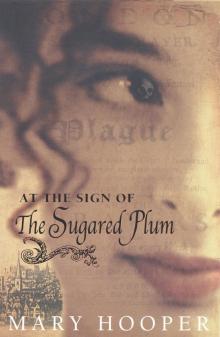 At the Sign of the Sugared Plum
At the Sign of the Sugared Plum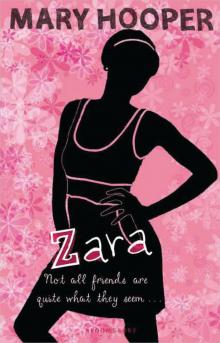 Zara
Zara Megan 3
Megan 3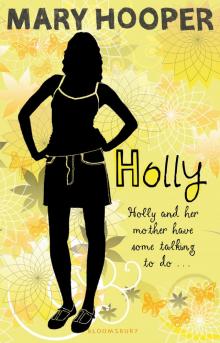 Holly
Holly By Royal Command
By Royal Command Newes from the Dead
Newes from the Dead Amy
Amy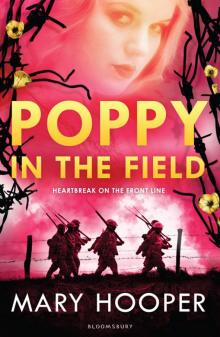 Poppy in the Field
Poppy in the Field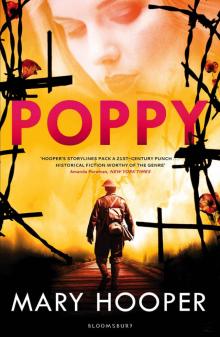 Poppy
Poppy Velvet
Velvet At the House of the Magician
At the House of the Magician The Remarkable Life and Times of Eliza Rose
The Remarkable Life and Times of Eliza Rose Chelsea and Astra
Chelsea and Astra The Betrayal
The Betrayal The Disgrace of Kitty Grey
The Disgrace of Kitty Grey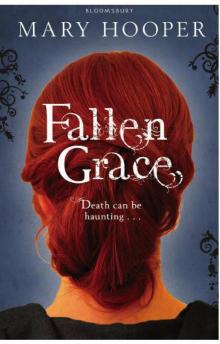 Fallen Grace
Fallen Grace